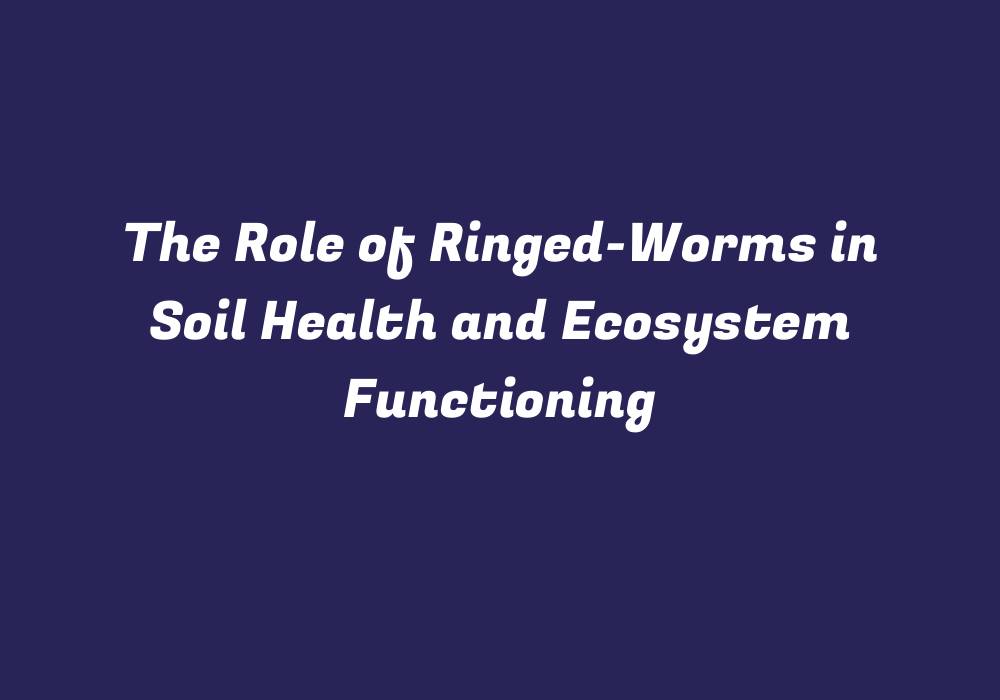Introduction:
Ringed-Worms and Their Impact on Soil Health
Soil health is crucial for the survival of plants, animals, and human beings. It’s a delicate ecosystem that supports life by providing nutrients, water, and a medium for growth. Over time, researchers have identified various organisms contributing to soil health, one such group being the ringed-worms, commonly known as enchytraeids or oligochaetes. These unique creatures play a significant role in maintaining the soil’s quality, promoting plant life, and sustaining overall ecosystem functioning.
Understanding Ringed-Worms
Ringed-worms are small, soft-bodied, annelid worms that can be found in diverse habitats worldwide. They range from 1mm to about 4cm in length, but their most distinctive feature is the presence of numerous rings running down their body length. These creatures exhibit a variety of lifestyles and play different roles in various environments. For instance, they are either free-living or live as parasites within other organisms such as earthworms.
Enchytraeids’ Role in Soil Health
Ringed-worms contribute to soil health by providing essential services that help maintain a stable, productive ecosystem. Their activities are crucial for the proper functioning of both agricultural and natural landscapes:
1. Aeration: Ringed-worms actively burrow through the soil, creating air spaces that allow better oxygen circulation and improve water infiltration. This helps plants grow more efficiently by increasing root activity and reducing their sensitivity to drought conditions.
2. Nutrient Cycling: As they move through the soil, ringed-worms consume microorganisms, which are an essential part of nutrient cycling. By breaking down organic matter, they release nutrients that become available for plant uptake, making them vital elements in the soil’s food web.
3. Ecosystem Stability: Ringed-worms feed on a range of organisms, including fungi and bacteria, playing a crucial role in maintaining ecological balance and stability. They also serve as a food source for various predators, such as birds, amphibians, and mammals, contributing to the overall health and diversity of the ecosystem.
4. Soil Structure and Stability: Ringed-worms create channels that help improve soil structure and reduce erosion. Their burrowing activities promote better soil aggregation, allowing it to hold more water, making it less prone to compaction or runoff.
Ecosystem Functioning and Biodiversity
Ringed-worms are not only essential for the health of soils but also play an integral role in sustaining ecosystem functioning. They interact with various organisms, forming part of complex food webs that support different levels of biodiversity.
1. Interactions with Plants: Ringed-worms consume fungal hyphae and mycorrhizal roots, which can increase the availability of nutrients like nitrogen to plants. This relationship is crucial for promoting plant growth and ensuring the health and productivity of agricultural systems.
2. Predator-Prey Relationships: Ringed-worms themselves are preyed upon by a variety of animals such as small mammals, reptiles, birds, and amphibians. This complex food web contributes to maintaining the stability and balance of ecosystem functioning.
3. Influence on Microorganism Populations: As they feed on microscopic organisms like bacteria and fungi, ringed-worms play a significant role in shaping microbial populations within the soil. This influences the overall health and productivity of various ecosystems, from natural habitats to agricultural landscapes.
Conclusion
Ringed-worms are small but vital contributors to soil health and ecosystem functioning. Their activities in aerating and loosening soil, recycling nutrients, and maintaining ecological balance make them indispensable for the wellbeing of both natural and agricultural systems. As scientists continue to explore their role in various environments, understanding ringed-worms’ influence on soil health will undoubtedly aid in promoting sustainable practices that safeguard our planet’s delicate ecosystems.
